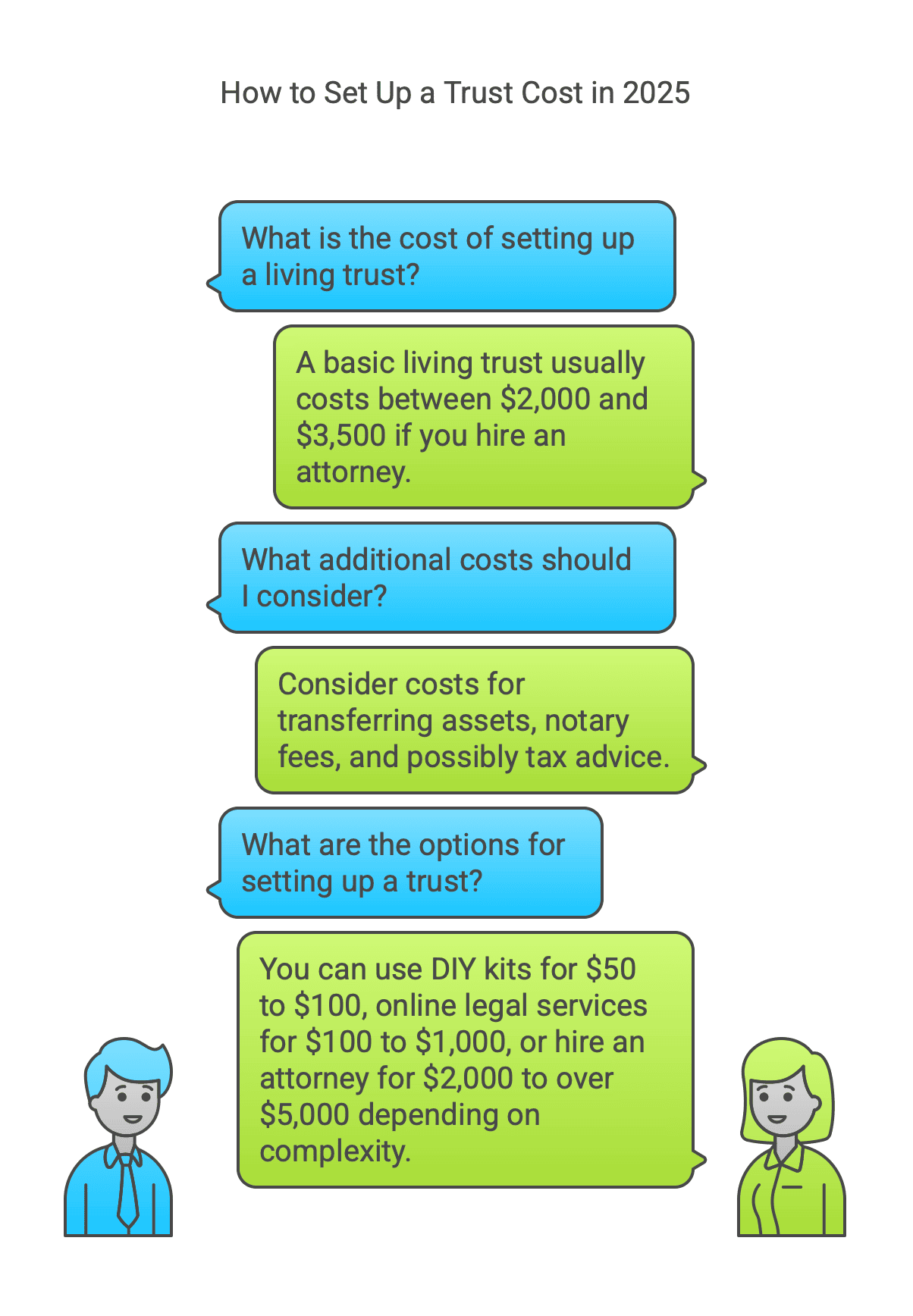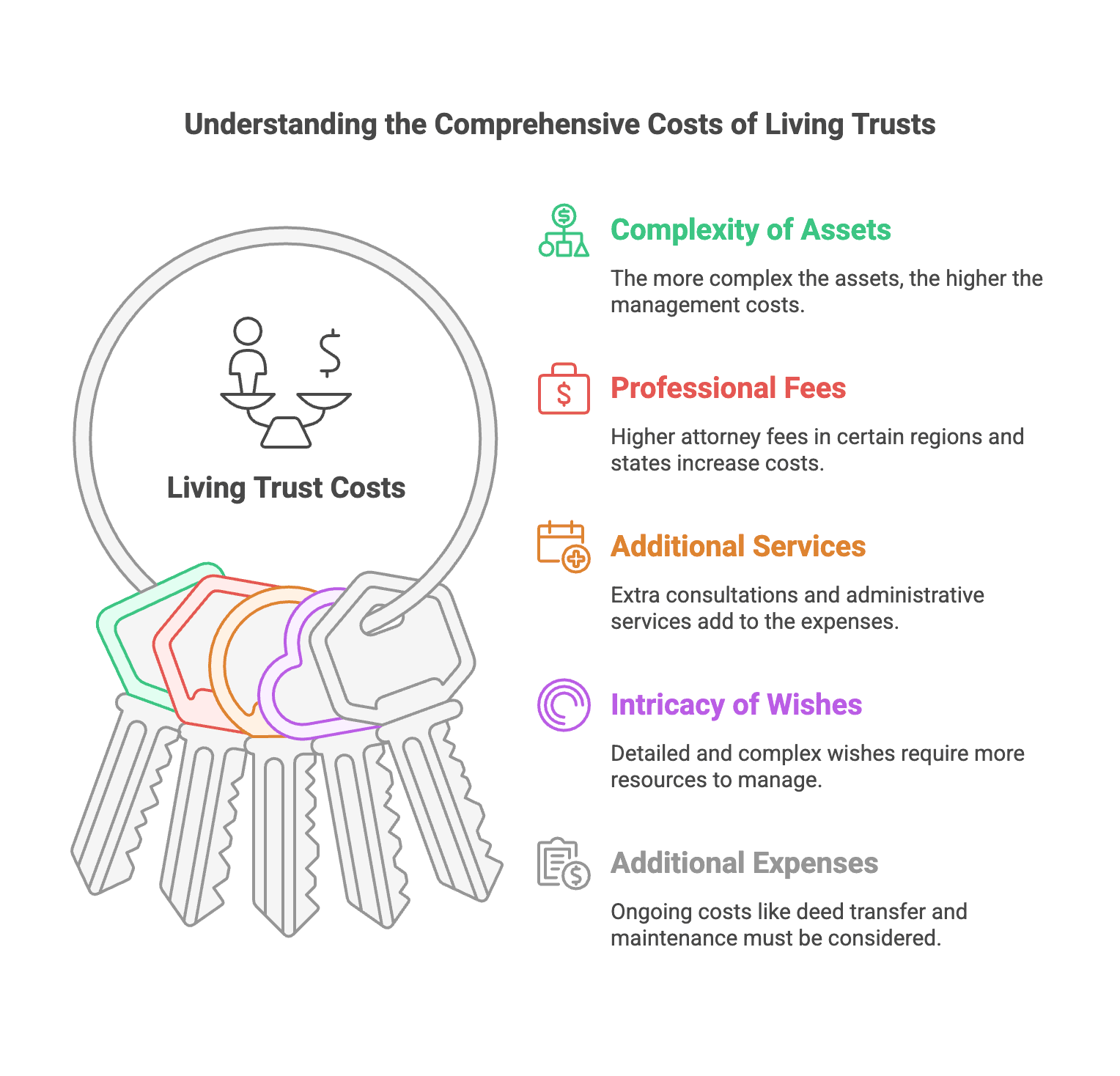Do you want to protect your assets and ensure your loved ones are financially secure through a living trust? Your living trust is a powerful tool in estate planning to transfer and manage your assets. However, a living trust cost can significantly impact your decision in 2025.
A living trust can avoid probate, protect your privacy, and give you more control in handling your legacy. So, understanding the costs upfront will help you avoid surprises and set you on the right path for smooth, stress-free estate planning.
Fales Law Group provides reliable assistance for establishing a successful living trust within your specific budget. Contact us today to secure the future of your loved ones wisely!
In this blog post guide, we’ll discuss the living trust cost, essential factors, and how to budget for your estate plan in 2025.
How to Set Up a Trust Cost in 2025
The cost of setting up a living trust can differ, like the type of trust and how complicated your estate is. A basic living trust usually costs between $2,000 and $3,500 if you hire an attorney. However, it could be more if your estate involves real estate or business assets.
You’ll also have to consider extra costs, like transferring assets into the trust, notary fees, and possibly getting advice from a tax professional. So, plan for these costs upfront to make sure your estate plan works well and stays within your budget.
Here’s a breakdown of what to expect when setting up a trust cost:
- Do-it-yourself (DIY) Kits: These kits include forms and instructions, typically costing $50 to $100. However, they require a solid understanding of estate planning laws, as mistakes can lead to legal complications.
- Online Legal Services: These services offer templates and step-by-step guidance, with prices ranging from $100 to $1,000. While more personalized than DIY kits, they may lack the in-depth advice of an attorney.
- Estate Planning Attorney: Hiring an attorney can range from $2,000 to $3,500 for a basic living trust, but can exceed $5,000 for more complex estates. Some attorneys charge a flat fee, while others bill hourly at $150 to $500 per hour.
Factors That Affect Living Trust Costs
The cost of setting up a living trust in 2025 depends on several essential factors. Firstly, you’ll need to decide between a revocable and irrevocable trust. Irrevocable trusts generally cost more due to their complexity. Attorney fees are another significant factor; while some charge a flat rate, others work hourly.
Here is a list of factors that affect living trust costs:
Factors Increasing Costs:
- Complexity of Assets: More complex estates with properties, investments, and business holdings will likely increase costs due to the additional work required to manage these assets within the trust.
- Professional Fees: Attorney fees are higher in areas with a higher cost of living. Also, some states have specific laws governing trusts, which may increase service costs.
- Additional Services: Costs can increase with added consultations and administrative charges.
- The intricacy of Wishes: More complex or detailed wishes can also increase the overall cost.
Additional Expenses to Consider:
- Deed Transfer Fees: These may apply if real estate is involved in the trust.
- Ongoing Maintenance: Adjusting the trust, funding assets in and out of the trust, and compensating trustees can incur further costs.
How to Budget for Your Living Trust in 2025
When you’re budgeting, setting realistic expectations about costs is essential. The fees can differ in various areas, so understanding the full range of potential expenses is key to saving more. You can use online tools to set up a basic trust, but hiring professionals is often better if your estate is complex or you want to ensure everything is legally sound.
So, keep in mind that creating a trust can also affect your taxes. Your tax advisor guides you through potential tax benefits or implications. To reduce costs, you can simplify your estate plan by limiting the assets in your trust or avoiding unnecessary legal services.
Balancing cost-saving strategies with the need for essential protections ensures you stay within your budget while making sure your trust meets your goals. Proper and in-time planning can save you time and money in the long run.
How to Avoid Mistakes When Budgeting for a Living Trust
To ensure your living trust functions as intended, here are some key strategies to avoid common mistakes:
- Engage an experienced estate planning attorney: Estate planning is a complex legal field, so consulting with an experienced attorney can provide personalized guidance, ensuring the trust document is correctly drafted to avoid ambiguities or strategic errors. Using online or DIY forms, or choosing an attorney based on the lowest price, can result in improperly prepared documents, potentially invalidating your plan.
- Properly fund the trust: A living trust is only effective if it’s properly funded, which means transferring ownership of assets into the trust. This involves titling assets correctly, such as making assets owned by the trustee of the trust or payable on death to the trust. Failing to fund the trust can result in assets going through probate, which defeats the purpose of using a living trust.
- Choose the right trustee: The trustee plays a vital role in executing the terms of the trust. Select someone honest, reliable, capable, and willing to undertake the responsibilities, with the ability to manage financial matters. Consider their relationship with the beneficiaries and their commitment to fulfilling your wishes as described in the trust.
- Regularly review and update the trust: Review the trust every few years, or whenever there are changes in personal, family, or financial circumstances. Changes in financial situation, assets, family structure, or relevant laws can necessitate revisions to the trust document.
- Understand financial needs: Assess what beneficiaries might need, considering factors like the costs of maintaining assets and potential long-term care.
- Don’t misplace beneficiary designations: Avoid transferring assets with designated beneficiaries, such as IRAs, life insurance policies, and annuities, into the trust, as these assets already bypass probate. However, you can name the trust as a beneficiary if concerned about creditors or other issues.
Estimate Your Living Trust Costs with Professional Help
Setting up your living trust involves various costs, like initial setup fees, ongoing maintenance, funding assets, and professional advice. That’s why you should understand these expenses early to avoid surprises later. With this mindset, consulting professionals can help you navigate the complexities of trust creation without any issues and extra costs.
Fales Law Group helps you keep your estate plan cost-effective and efficient. Our experienced estate planning attorney provides you with realistic guidance through the process. Schedule a free consultation with our estate attorney today!
Common Questions
Frequently Asked Questions
What is the typical cost of creating a living trust?
The cost of establishing a living trust varies based on factors such as the complexity of your estate and the method you choose for creation. Generally, a basic living trust prepared by an attorney ranges from $1,000 to $3,000. For more intricate estates, especially those involving multiple properties or business interests, the cost can exceed $5,000. Alternatively, do-it-yourself kits and online legal services are available at lower costs, typically between $50 and $1,000, but they may lack personalized legal guidance.
What factors influence the cost of setting up a living trust?
Several elements can affect the overall cost:
- Complexity of Assets: Estates with diverse assets like real estate holdings, investments, or business interests require more detailed planning, increasing the cost.
- Professional Fees: Attorney fees vary based on experience, location, and fee structure (flat rate vs. hourly).
- Additional Services: Services such as transferring assets into the trust, notary fees, and consultations with tax professionals can add to the total expense.
- Geographic Location: The cost of legal services can differ by region due to varying living costs and state-specific regulations.
Are there ongoing costs associated with a living trust?
Yes, maintaining a living trust may involve ongoing expenses, including:
- Trustee Fees: If you appoint a professional trustee, they may charge annual fees, often a percentage of the trust’s assets.
- Administrative Costs: Periodic updates to the trust, asset management, and compliance with legal requirements can incur additional costs.
- Tax Preparation Fees: Depending on the trust’s structure and assets, specialized tax filings may be necessary, leading to further expenses.
How can I budget effectively for creating a living trust?
To budget wisely:
- Assess Your Estate’s Complexity: Understand the nature and value of your assets to determine the level of planning required.
- Choose the Right Professional Assistance: While DIY options are cost-effective, consulting with an experienced estate planning attorney ensures legal accuracy and personalized advice, which is crucial for complex estates.
- Plan for Ancillary Costs: Account for additional expenses such as asset transfer fees, notary charges, and potential tax consultations.
- Seek Transparent Pricing: Request detailed quotes from professionals to understand the scope of services and associated costs.
Is investing in a living trust cost-effective in the long run?
While the initial setup of a living trust involves costs, the long-term benefits often outweigh these expenses. A living trust can help your estate avoid probate, maintain privacy, and provide clear directives for asset distribution, potentially saving your beneficiaries time, legal fees, and reducing stress during the settlement process. Investing in a well-structured living trust is a proactive measure to ensure your estate is managed according to your wishes, providing peace of mind for you and your loved ones.
For personalized guidance tailored to your specific circumstances, consider consulting with an estate planning professional. They can provide detailed insights into the costs and benefits relevant to your situation.
What role does an estate planning attorney play in the process?
An estate planning attorney provides expert guidance, ensures compliance with local laws, drafts necessary documents, and helps you navigate the complexities of protecting your assets and wishes.



